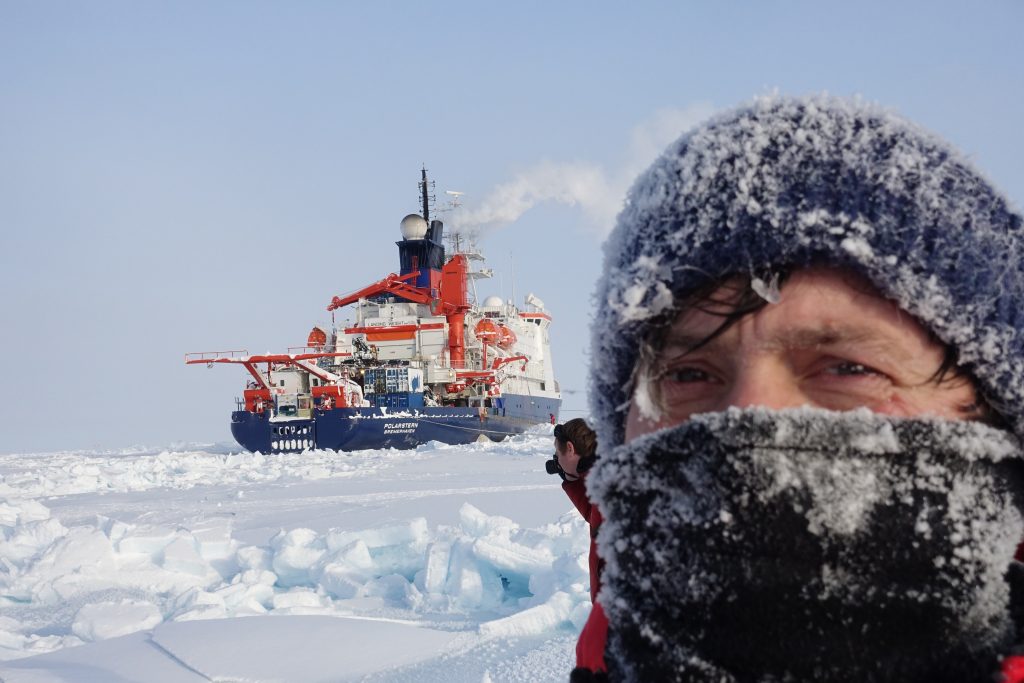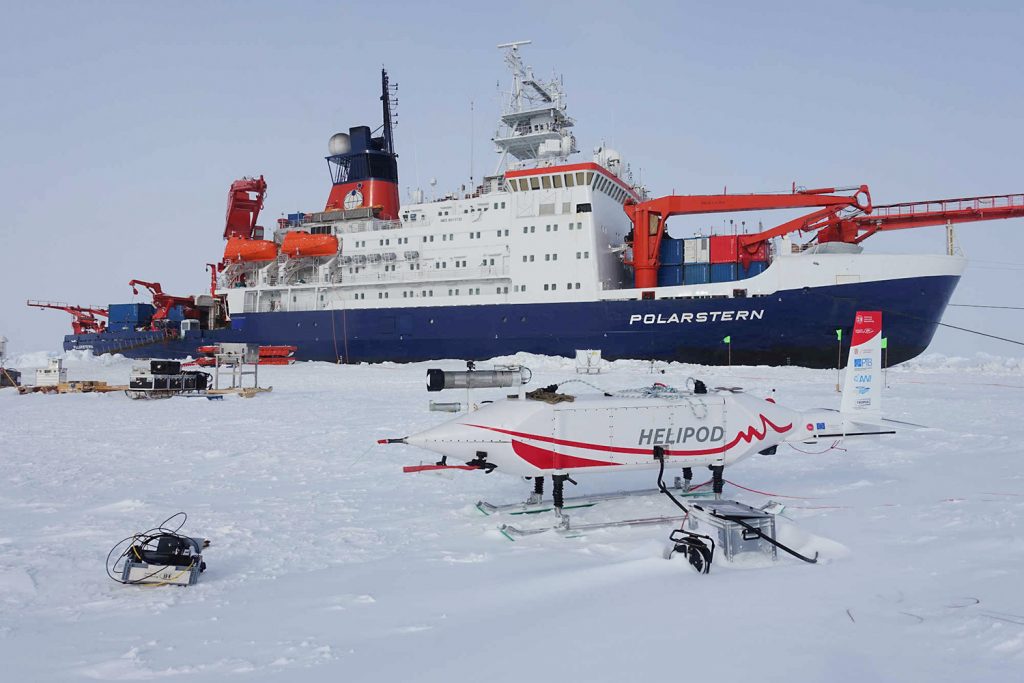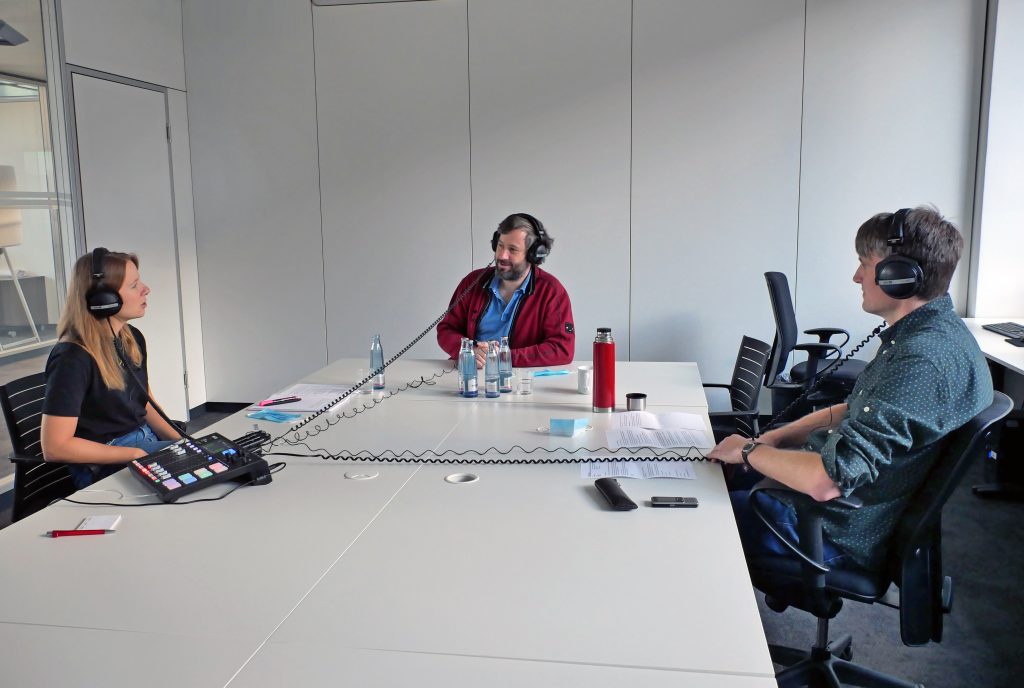New Podcast: “Forsch! – Science in Interview”
Startseite » New Podcast: “Forsch! – Science in Interview”
New Podcast: “Forsch! – Science in Interview”
In the first episode of the new science podcast “Forsch!”, hosts Laura Franz (ForschungRegion Braunschweig) and Andreas Eberhard (Braunschweiger Zeitung) speak with aerospace engineer Falk Pätzold about his participation in the gigantic Mosaic expedition to the North Pole, his climate measurements, and daily life aboard the “Polarstern”.

160 Days in the Ice
It is a cool November morning when we meet TU scientist Dr. Falk Pätzold in the well-ventilated rooms of the Braunschweiger Zeitung to record the pilot episode of the new science podcast “Forsch! – Science in Interview”. The current temperatures of just over 4 degrees Celsius must seem almost tropical to Pätzold, compared to the icy cold that the Arctic wind mercilessly whips around one’s ears in the Arctic Ocean. The weather, the solitude, and the monotonous, yet uniquely beautiful view of the ice as far as the eye can see, are just some of the physical and mental challenges faced by the scientists of the international MOSAiC expedition.
While it is not Pätzold’s first expedition to the Arctic, it is his longest to date. He spent a full 160 days aboard the German research vessel “Polarstern”, in addition to several weeks of travel to and from the region. In February 2020, he set off with other scientists towards the North Pole to relieve the previous research team there. This exchange took place every few months, allowing a total of over 400 researchers from around the world to participate in the year-long MOSAiC expedition to the Arctic, coordinated by the Alfred Wegener Institute. The expedition’s goal is to better understand the Arctic’s influence on the global climate.
Better Understanding the Climate
“Climate is a global matter. The poles are an important component of our global climate,” explains Pätzold. The processes in the Arctic are not yet sufficiently understood to explain all the effects that result from them in the global climate. “This is because the Arctic is a very inhospitable place. Getting there is difficult. Therefore, there are relatively few measurement data from this region.” Previous Arctic expeditions were also mostly limited to the summer half of the year, whereas extensive measurements from winter are lacking. The data collected by the MOSAiC expedition is now intended to fill these gaps and create a better understanding of the Arctic’s influence on the global climate. “Investigating an entire year with this number of international scientists is new,” says Pätzold, whose task was to conduct atmospheric measurements from the air using the helicopter-towed probe “Helipod”.

Poor Internet and Lean Communication
Communication between Pätzold on the Polarstern and his team at the institute in Braunschweig posed a challenge. Despite meticulous preparation, software updates had to be programmed by the Braunschweig team during the expedition and subsequently integrated into the system by Pätzold on-site. Pätzold refers to this as “lean communication” when an email, due to the limited transmission capabilities in the Arctic Ocean, can take several hours to reach the recipient.
Whether the researcher has already gained initial insights into climate change, what leisure activities can look like on a research vessel in the middle of the Arctic, and what is best done to combat chocolate shortages – you can find out in this episode of “Forsch!”.

The podcast “Forsch! – Science in Interview” is a cooperation between ForschungRegion Braunschweig and Braunschweiger Zeitung. Hosts Laura Franz (ForschungRegion Braunschweig) and Andreas Eberhard (Braunschweiger Zeitung) give researchers from the region a voice. They report on their motivation, their work – and how it changes their view of the world.
A new episode every month, effective immediately.
Listen directly here or stream on Spotify, Apple Music or Deezer .
